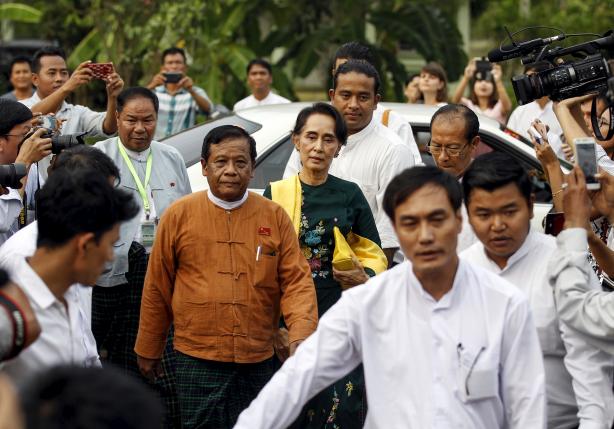
National League for Democracy (NLD) party leader Aung San Suu Kyi arrives for a meeting with NLD members of parliament at Sipin Guesthouse in Naypyitaw.
Naypyitaw – Myanmar’s military nominated a former junta stalwart who is still, currently, on a U.S. sanctions list as its choice for vice president on Friday, pointing to battles ahead for National League for Democracy leader Aung San Suu Kyi and her selected president. While working alongside a military that retains much political power, Myanmar’s first democratically elected government for more than 50 years faces a tough challenge aiming to deliver the reform and economic growth demanded by the electorate.
Confirming Htin Kyaw, as its presidential candidate the lower house of parliament voted for Kyaw’s advantage on Friday, noting that Kyaw is a close friend and a confidant of Nobel laureate Suu Kyi. This brought the top office a step closer for the man expected to rule as her proxy. Military MPs met behind closed doors and nominated retired general Myint Swe as their candidate, across town in the capital of Naypyitaw. He was head of the feared military intelligence under former junta leader Than Shwe.
Myint Swe also was the head of special operations in Yangon, when Than Shwe demanded a crackdown on anti-junta protests led by Buddhist monks in 2007, known as the Saffron Revolution.
One of the 166 military lawmakers, who under the constitution hold a quarter of seats in parliament said that there was no one who objected on the proposal, or rejected it, when we held a meeting to choose and decide the vice presidential candidate. Suu Kyi has said she planned to form a government of reconciliation to help bridge the deep divisions in Myanmar, formerly known as Burma, after nearly 50 years of military rule.
“We will hold on the national reconciliation policy no matter what the military decides,” said NLD spokesperson Zaw Myint Maung, adding that they will try to work along, with the military for national reconciliation.
Given the NLD’s outright majority in the upper and lower houses of parliament, it can be said that the vote in the lower house on Friday for Suu Kyi’s presidential nominee was never in doubt. Suu Kyi, who showed up in a blue dress and white sash, was the first NLD lawmaker to cast her ballot.
While with NLD dominance, it is likely for Kyaw to become the first head of state who is not a serving or former senior general since the army seized power in 1962. Noting, that the two houses will come together to vote on the presidency next week.
On the other side, a gap between Suu Kyi and the military had widened up in the run-up to the presidential nominations. Sources in Kyi’s camp, state that she became frustrated with military intransigence on issues ranging from amending the constitution that bars her from the presidency to minor formalities such as the location of the handover of power. The military has declined to comment on negotiations with the NLD. Some in Suu Kyi’s party said the choice of Myint Swe went against the spirit of reconciliation.
“Aung San Suu Kyi tried really hard to negotiate with them for national reconciliation,” said one senior NLD official. “They don’t trust us. It’s their final shot to protect themselves and their interests.” While Than Shwe disappeared from public life after handing over power to a semi-civilian government in 2011, Myint Swe’s nomination will fuel the suspicions of many in Myanmar that the former junta leader still holds considerable sway.
“Myint Swe is very close to former senior military officials, especially former supremo Than Shwe,” said political analyst Yan Myo Thein. “His nomination may mean Than Shwe is still influencing behind the scenes.” Myint Swe is listed on the U.S. Treasury Department list of sanctioned individuals due to his role in the former military government.
In fact, the junta-drafted 2008 constitution bars officials whose parents, spouse, children or their spouses are citizens of other countries from becoming president, a clause widely seen as aimed specifically at the NLD leader.
Thus, although Myint Swe was considered as a vice presidential candidate in 2010 however he was barred from the job because his son-in-law was an Australian citizen – the same provision that prevents Suu Kyi from becoming president. Noting that, Swe’s son-in-law has since given up his Australian citizenship.
Flouting the ban on her presidency, Suu Kyi has said she would run the country through a proxy.
Under Myanmar’s indirect system for electing a president, three candidates are nominated – one by the lower house, one by the upper house, and one by the military bloc in parliament.
The two losing nominees becoming vice presidents. It is expected that the other vice president is the NLD’s nomination from the upper house. He is Henry Van Thio, a member of the Chin ethnic group from the country’s northwest. The president picks the cabinet that will take over from President Thein Sein’s outgoing government on April 1, with the exception of the heads of the home, defence and border security ministries who will be appointed by the armed forces chief.
